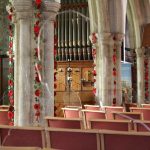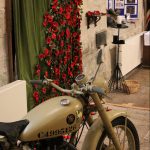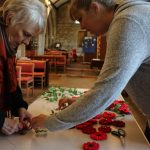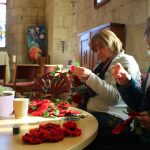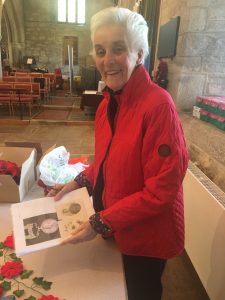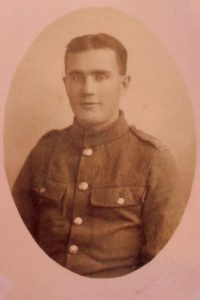We Will Remember Them
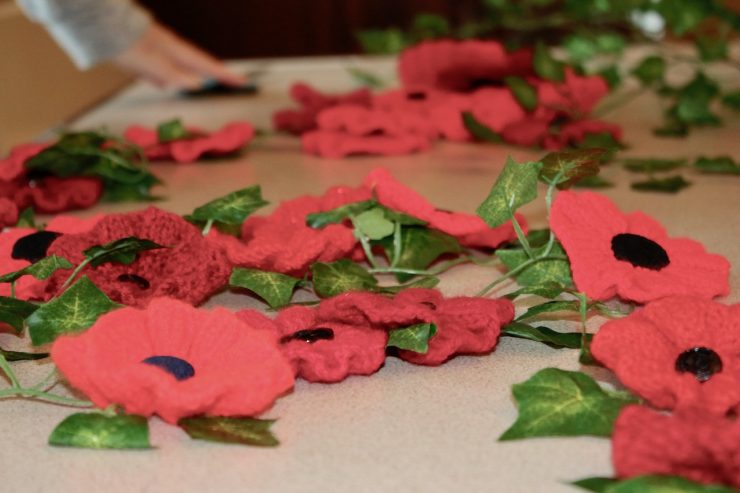
Knitted poppies from St Stephens
They shall grow not old, as we that are left grow old:
Age shall not weary them, nor the years condemn.
At the going down of the sun and in the morning
We will remember them.
Robert Laurence Binyon
Across Cornwall parishes are putting together poignant displays to commemorate the end of WWI. From knitting poppies to lighting up churches, exhibiting memorabilia to silhouettes of the fallen, people are coming together to make sure “We will remember them.”
At the heart of this determination is the truth that one in every six families in Britain at the time suffered a bereavement because of the war. There are so many stories of whole families lost, generations of young men wiped out and the dreadful aftermath of mentally and emotionally scarred soldiers returning to a country that didn’t have the funds to look after or even employ them.
Nations fighting alongside as well as against nations
The war came at a time when the British Empire was at his height, covering a fifth of the world. All the colonies and British dominions from India, the Middle and Far East, Africa and Australia automatically went to war with us, making it truly a world war. Fought on fronts across the globe, diversity reigned as nations fought alongside, as well as against, nations.
Margaret Northey’s father, Bert, knew how that felt. Too young to fight, he lied about his age to join his four brothers in the Cornwall Light Infantry First Battalion and serve in Afghanistan, India, Peshawar, Salonika and France. Like many who returned, Bert didn’t want to talk about what happened except to say his brother Reginald died very near to him in France and another brother lost a leg. The young Bert contracted malaria and was given the option to go home, instead he bravely returned to the front.
- Margaret Northey with her father's medals
- Bert Michaels, Margaret's father
Love wins
It must have been dreadful for Bert, but Margaret believes that love wins – and Bert surely loved his May, Margaret’s mother. Before the war, May joined the staff at Caerhays Castle where Bert’s brothers worked, and they remarked how pretty she was. Intrigued, Bert waited to see her trot past in a pony and trap on the way to chapel with her mistress. He was so captivated he waited some more until she drove back again. “Eyes off, she’s mine,” he said to his brothers and set about wooing and winning her. The scullery maids always knew when Bert was waiting for May under the tree across the valley as they could hear him playing his cornet to let her know he was there. The couple were married for 65 years, dying three weeks apart at the age of 89.
The war to end all wars
Told it was the war to end all wars, it’s hard to imagine how the survivors like Bert felt when the next war broke out barely 20 years later and his two sons left to fight. The Great War downgraded to World War One.
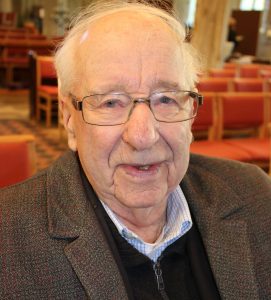
Roy Olver
Roy Olver, 95, recollects hearing the news of WWII breaking out, “I remember Mrs Bilkey rushing out of her cottage crying that we were at war. I couldn’t understand why she was so upset – I didn’t really know what war meant.” But to Mrs Bilkey, whose husband had fought in the First World War, it meant a great deal, as Roy came to realise.
Roy was just 16 at the time. His brother had had an accident that had left him partially blind and so Roy had left school at 13 to help his father manage the family farm. As the nation was in genuine danger of running out of food as all imports were cut off, Roy was exempted from enlisting as he had to run the farm to support the vital work of food production.
The Home Guard
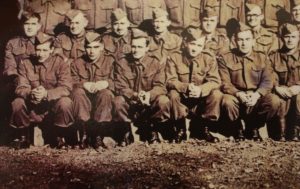
Roy in the Home Guard, first row, first on the left
Instead, Roy joined the Home Guard and spent many long nights patrolling the countryside followed by long days working the land. It was hard and, particularly during Double Summertime, relentless, “You’d get up just as early but not be able to do what you needed to do to the crop as there was still dew on it. So you filled the time with other jobs and then worked in the fields until the light faded after 10 o’clock.” But Roy was grateful. “Those in the army didn’t get to worry about the clock. I didn’t see that I had anything to complain about.” You can read Roy’s story here.
Through the grimness light shines and hope survives
The Great War, World War One, whatever you choose to call it, and all the conflicts that have followed are inevitably described in terms of tragedy, sacrifice and loss. There are no winners, but through the grimness and the darkness, light shines and hope survives.
War is a sacrifice too great to forget, which is why there is such determination to remember them. In that remembrance, communities have come together and shared stories and memories of their wartime experiences. There are some wonderful insights across churches, halls and community spaces across Cornwall of how people pulled together, how hope flourished, and how, like for Bert and May, love wins.
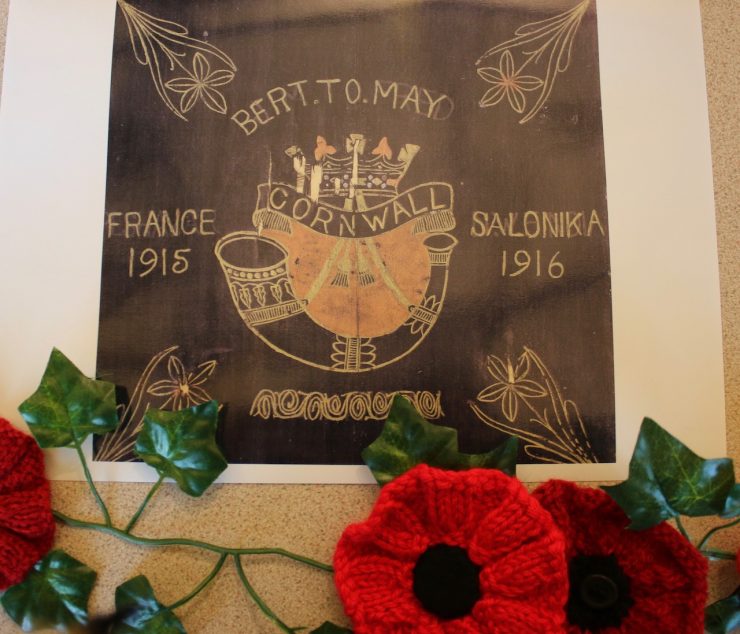
A gold embroidered testament to Bert’s love for May sent from the front to his beloved.
